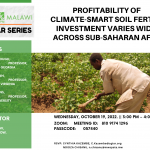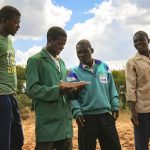Click here to download the seminar schedule To join, visit our events page
Virtual event: Profitability of Climate-Smart Soil Fertility Investment across sub-Saharan Africa
This is the first of the MwAPATA-IFPRI joint seminar series. View the full list here. Abstract: Soil fertility investments in sub-Saharan Africa, where budgetary resources are scarce, must be well targeted. Using a causal forest algorithm and an experimental maize trial dataset matched with geocoded rainfall, temperature and soils data, we modelled site-specific, ex ante […]
Virtual event: Building Resilient Communities – Learning from Titukulane’s Integrated Approach in Malawi
Abstract: Titukulane is a $75M five-year USAID-funded Resilience Food Security Activity, running from 2019 to 2024. The program is implementing Malawi’s National Resilience Strategy (NRS) in Mangochi and Zomba districts. NRS guides investments in agriculture, reduction in impacts and improvements in recovery from shocks, promotion of household resilience, strengthening the management of Malawi’s natural resources, […]
Stakeholder Validation Meeting- IFPRI Study on Primary Agricultural Cooperatives in Malawi
IFPRI Malawi, with funding from the Government of Flanders, is conducting a study to assess the performance of primary agricultural cooperatives in Malawi in order to provide evidence to the Government of Malawi, donors, NGOs, cooperative leaders, and other stakeholders. Recommendations will be formulated to develop strategies and mechanisms to build the capacity and inclusiveness […]
Event Announcement: Stakeholder Validation Meeting- IFPRI Study on Primary Agricultural Cooperatives in Malawi
IFPRI Malawi, with funding from the Government of Flanders, is conducting a study to assess the performance of primary agricultural cooperatives in Malawi in order to provide evidence to the Government of Malawi, donors, NGOs, cooperative leaders, and other stakeholders. Recommendations will be formulated to develop strategies and mechanisms to build the capacity and inclusiveness […]
- « Previous Page
- 1
- 2
- 3
- 4
- 5
- …
- 14
- Next Page »




